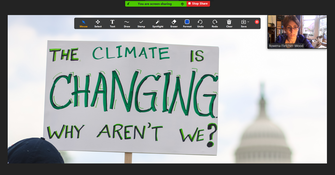Rethinking behaviour change at Communicate 2020
Rethinking behaviour change was just one session that ran during the two-day Communicate 2020 desktop conference on 26th and 27th November organised by the Natural History Consortium. The session concentrated on the psychology of climate action, and emphasised the value of integrating professional identity with climate advocacy to drive “agency”.
The session featured speaker Dr Kris De Meyer, King’s College London, and was chaired by Ruth Larbey, University of the West of England. Dr De Meyer began by discussing the value-action gap between environmental attitudes and actions. His survey findings showed that “powerless” was the word people most often associated with their feelings towards climate and environmental change; when asked what they were doing to mitigate their concerns, 98% provided consumer-based answers, largely connected with recycling and minimising nonessential plastic packaging. This surprisingly high result is demonstrable of the impact of consumerism on our everyday lives, driving us to think only in anti-consumerism terms when we evaluate our potential for climate action. Unsurprisingly, the two are linked: domestic plastic waste management has only a very limited environmental impact, leading to feelings of impotence. Further, the survey demonstrated that the public conflate broader environmental issues and climate change. As professionals in environmental science, this highlights an area for improved communication.
The session featured speaker Dr Kris De Meyer, King’s College London, and was chaired by Ruth Larbey, University of the West of England. Dr De Meyer began by discussing the value-action gap between environmental attitudes and actions. His survey findings showed that “powerless” was the word people most often associated with their feelings towards climate and environmental change; when asked what they were doing to mitigate their concerns, 98% provided consumer-based answers, largely connected with recycling and minimising nonessential plastic packaging. This surprisingly high result is demonstrable of the impact of consumerism on our everyday lives, driving us to think only in anti-consumerism terms when we evaluate our potential for climate action. Unsurprisingly, the two are linked: domestic plastic waste management has only a very limited environmental impact, leading to feelings of impotence. Further, the survey demonstrated that the public conflate broader environmental issues and climate change. As professionals in environmental science, this highlights an area for improved communication.
|
To do this, we need to reframe climate advocacy. More research or statistics will not help – the audience are convinced. Nor will more militancy be more persuasive: although counterintuitive, language of crisis actually distances most people and enhances feelings of powerlessness. However, so long as climate advocacy remains extrinsic to identity, the barriers to change seem unsurmountable. So how do we inspire intrinsic motivation?
|
Dr De Meyer brought the focus onto community and, especially, professional identities. Many lack confidence in these identities because it is not immediately obvious how their identity as a parent, sportsperson, or businessperson links to “climate agency”. However, these are roles in which we have more influence and can stimulate greater actions than avoiding plastic straws. As a result of work at King’s College London, new conversations are now being developed to help guide people into recognising the useful actions they could take professionally to advocate for the environment.
Borrowing from social psychology, Dr De Meyer advocated for incremental steps and ‘self persuasion’. For example, whilst a person who has always owned a car cannot see how they could do without, a person who has never owned one cannot see why they would. By taking a first “climate action” such as walking to work, we gradually convince ourselves we could do a little more and invest further. After a period of time and effort, this investment comes intrinsic to identity. When asked, most audience members identified their first climate action as becoming a vegetarian. This is an excellent example of intrinsic motivation because vegetarianism is identity-based.
These findings link well to those by ClairCity who examined public motivations to improve air quality, and which is reviewed by Jeremy Thomas on page 15.
Borrowing from social psychology, Dr De Meyer advocated for incremental steps and ‘self persuasion’. For example, whilst a person who has always owned a car cannot see how they could do without, a person who has never owned one cannot see why they would. By taking a first “climate action” such as walking to work, we gradually convince ourselves we could do a little more and invest further. After a period of time and effort, this investment comes intrinsic to identity. When asked, most audience members identified their first climate action as becoming a vegetarian. This is an excellent example of intrinsic motivation because vegetarianism is identity-based.
These findings link well to those by ClairCity who examined public motivations to improve air quality, and which is reviewed by Jeremy Thomas on page 15.


